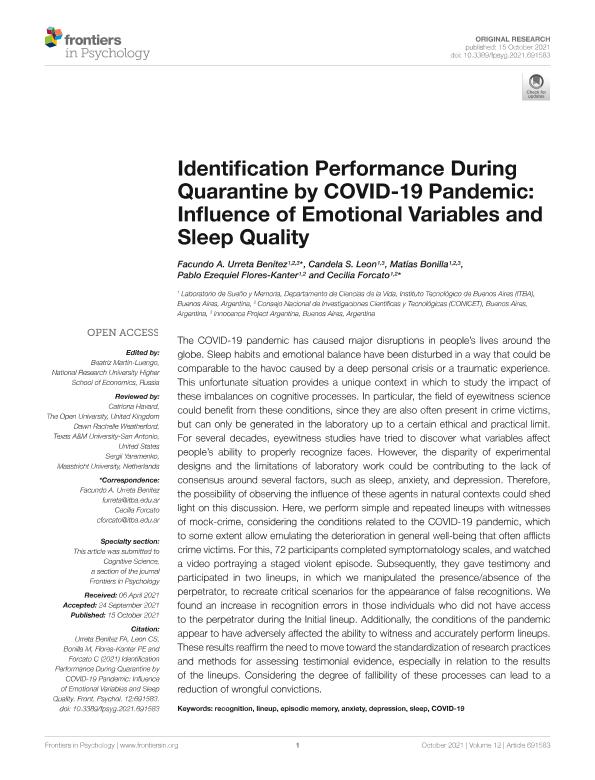Mostrar el registro sencillo del ítem
dc.contributor.author
Urreta Benitez, Facundo Antonio

dc.contributor.author
León, Candela Sofía

dc.contributor.author
Bonilla, Matías

dc.contributor.author
Flores Kanter, Pablo Ezequiel

dc.contributor.author
Forcato, Cecilia

dc.date.available
2023-08-11T18:55:46Z
dc.date.issued
2021-10
dc.identifier.citation
Urreta Benitez, Facundo Antonio; León, Candela Sofía; Bonilla, Matías; Flores Kanter, Pablo Ezequiel; Forcato, Cecilia; Identification Performance During Quarantine by COVID-19 Pandemic: Influence of Emotional Variables and Sleep Quality; Frontiers Media; Frontiers in Psychology; 12; 10-2021; 1-14
dc.identifier.issn
1664-1078
dc.identifier.uri
http://hdl.handle.net/11336/208035
dc.description.abstract
The COVID-19 pandemic has caused major disruptions in people’s lives around the globe. Sleep habits and emotional balance have been disturbed in a way that could be comparable to the havoc caused by a deep personal crisis or a traumatic experience. This unfortunate situation provides a unique context in which to study the impact of these imbalances on cognitive processes. In particular, the field of eyewitness science could benefit from these conditions, since they are also often present in crime victims, but can only be generated in the laboratory up to a certain ethical and practical limit. For several decades, eyewitness studies have tried to discover what variables affect people’s ability to properly recognize faces. However, the disparity of experimental designs and the limitations of laboratory work could be contributing to the lack of consensus around several factors, such as sleep, anxiety, and depression. Therefore, the possibility of observing the influence of these agents in natural contexts could shed light on this discussion. Here, we perform simple and repeated lineups with witnesses of mock-crime, considering the conditions related to the COVID-19 pandemic, which to some extent allow emulating the deterioration in general well-being that often afflicts crime victims. For this, 72 participants completed symptomatology scales, and watched a video portraying a staged violent episode. Subsequently, they gave testimony and participated in two lineups, in which we manipulated the presence/absence of the perpetrator, to recreate critical scenarios for the appearance of false recognitions. We found an increase in recognition errors in those individuals who did not have access to the perpetrator during the Initial lineup. Additionally, the conditions of the pandemic appear to have adversely affected the ability to witness and accurately perform lineups. These results reaffirm the need to move toward the standardization of research practices and methods for assessing testimonial evidence, especially in relation to the results of the lineups. Considering the degree of fallibility of these processes can lead to a reduction of wrongful convictions.
dc.format
application/pdf
dc.language.iso
eng
dc.publisher
Frontiers Media

dc.rights
info:eu-repo/semantics/openAccess
dc.rights.uri
https://creativecommons.org/licenses/by-nc-sa/2.5/ar/
dc.subject
ANXIETY
dc.subject
COVID-19
dc.subject
DEPRESSION
dc.subject
EPISODIC MEMORY
dc.subject
LINEUP
dc.subject
RECOGNITION
dc.subject
SLEEP
dc.subject.classification
Biología

dc.subject.classification
Ciencias Biológicas

dc.subject.classification
CIENCIAS NATURALES Y EXACTAS

dc.title
Identification Performance During Quarantine by COVID-19 Pandemic: Influence of Emotional Variables and Sleep Quality
dc.type
info:eu-repo/semantics/article
dc.type
info:ar-repo/semantics/artículo
dc.type
info:eu-repo/semantics/publishedVersion
dc.date.updated
2023-08-11T14:53:40Z
dc.journal.volume
12
dc.journal.pagination
1-14
dc.journal.pais
Suiza

dc.description.fil
Fil: Urreta Benitez, Facundo Antonio. Instituto Tecnológico de Buenos Aires; Argentina. Consejo Nacional de Investigaciones Científicas y Técnicas; Argentina
dc.description.fil
Fil: León, Candela Sofía. Instituto Tecnológico de Buenos Aires; Argentina. Consejo Nacional de Investigaciones Científicas y Técnicas; Argentina
dc.description.fil
Fil: Bonilla, Matías. Consejo Nacional de Investigaciones Científicas y Técnicas; Argentina. Instituto Tecnológico de Buenos Aires; Argentina
dc.description.fil
Fil: Flores Kanter, Pablo Ezequiel. Instituto Tecnológico de Buenos Aires; Argentina. Consejo Nacional de Investigaciones Científicas y Técnicas; Argentina
dc.description.fil
Fil: Forcato, Cecilia. Instituto Tecnológico de Buenos Aires; Argentina. Consejo Nacional de Investigaciones Científicas y Técnicas; Argentina
dc.journal.title
Frontiers in Psychology
dc.relation.alternativeid
info:eu-repo/semantics/altIdentifier/url/https://www.frontiersin.org/article/10.3389/fpsyg.2021.691583
dc.relation.alternativeid
info:eu-repo/semantics/altIdentifier/doi/http://dx.doi.org/10.3389/fpsyg.2021.691583
Archivos asociados
